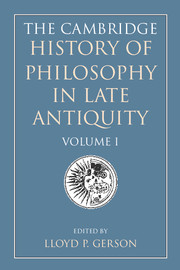Book contents
- Frontmatter
- General introduction
- I Philosophy in the later Roman Empire
- II The first encounter of Judaism and Christianity with ancient Greek philosophy
- III Plotinus and the new Platonism
- IV Philosophy in the age of Constantine
- Introduction to Part IV
- 20 Philosophy in a Christian empire: from the great persecution to Theodosius I
- 21 Themistius
- 22 The Alexandrian school. Theon of Alexandria and Hypatia
- 23 Hierocles of Alexandria
- V The second encounter of Christianity with ancient Greek philosophy
- Map 1 The Byzantine Empire, c. 500
23 - Hierocles of Alexandria
from IV - Philosophy in the age of Constantine
Published online by Cambridge University Press: 28 May 2011
- Frontmatter
- General introduction
- I Philosophy in the later Roman Empire
- II The first encounter of Judaism and Christianity with ancient Greek philosophy
- III Plotinus and the new Platonism
- IV Philosophy in the age of Constantine
- Introduction to Part IV
- 20 Philosophy in a Christian empire: from the great persecution to Theodosius I
- 21 Themistius
- 22 The Alexandrian school. Theon of Alexandria and Hypatia
- 23 Hierocles of Alexandria
- V The second encounter of Christianity with ancient Greek philosophy
- Map 1 The Byzantine Empire, c. 500
Summary
LIFE AND WRITINGS
From the Byzantine scholar Photius we learn that Hierocles dedicated his treatise On Providence to the historian Olympiodorus whose work covers the period from 407 to 425 ce (Bibl. cod. 214. 171b22–32). Photius further tells us that Hierocles described himself as a student of Plutarch of Athens who died in 431/2 (cod. 214. 173a 37–9). These dates allow us to place the floruit of Hierocles’ life within the first half of the fifth century ce.
It was then during the reign of Theodosius II (408–50) that Hierocles was active, teaching and writing in Alexandria after his discipleship with Plutarch in Athens. Very little is known of Plutarch (whose writings do not survive) but he appears to have been an important link for his pupils, not only Hierocles but also Syrianus who later became the mentor of Proclus, to the thought of Iamblichus with its emphasis on the revelatory nature of philosophy, on the Chaldaean Oracles, and theurgy. Thus schooled by Plutarch Hierocles returned to Alexandria, a city that could boast a long tradition of philosophical activity, going back to Eudorus the Platonist (fl. 35 bce). Alexandria was also the home of the Jewish theologian and Platonist Philo, of the Christian philosophers Clement and Origen, and of Ammonius and his students, yet all these thinkers had long since passed away before the arrival of Hierocles. Other than his younger contemporary Hypatia, whose interests anyhow seem to have been more mathematical than philosophical, Hierocles had no serious rival in philosophy.
- Type
- Chapter
- Information
- The Cambridge History of Philosophy in Late Antiquity , pp. 437 - 456Publisher: Cambridge University PressPrint publication year: 2000
- 2
- Cited by

